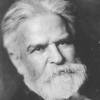BALTHAZAR: Sigh no more, ladies, sigh no more,
Men were deceivers ever,
One foot in sea and one on shore,
To one thing constant never.
Then sigh not so, but let them go,
And be you blithe and bonny,
Converting all your sounds of woe
Into Hey, nonny nonny.William Shakespeare (1564-1616) English dramatist and poet
Much Ado About Nothing, Act 2, sc. 3, l. 64ff (2.3.64-71) (1598)
"Hey, nonny nonny" was a nonsense refrain popular in English music during the Elizabethan era; in context here, it means stop grieving over the guy that dumped you and put that effort instead into some merry-making and song. Music historian Ross Duffin believes the form of Balthazar's tune fits a popular song of the Tudor period, "The Lusty Gallant."
Quotations about:
betrayal
Note not all quotations have been tagged, so Search may find additional quotes on this topic.
ANNAS: Your help in this matter won’t go unrewarded.
CAIAPHAS: We’ll pay you in silver — cash on the nail.
We just need to know where the soldiers can find him.ANNAS: With no crowd around him.
CAIAPHAS:Then we can’t fail.
JUDAS: I don’t need your blood money!
CAIAPHAS: Oh, that doesn’t matter, our expenses are good.
JUDAS: I don’t want your blood money!
ANNAS: But you might as well take it. We think that you should.
CAIAPHAS: Think of the things you could do with that money,
Choose any charity — give to the poor.
We’ve noted your motives — we’ve noted your feelings.
This isn’t blood money — it’s a fee, nothing —
Fee, nothing — fee, nothing more.Tim Rice (b. 1944) British lyricist and author
Jesus Christ Superstar, “Blood Money” (1970) [music by Andrew Lloyd Webber]
(Source)
(Source (audio))
The movie version reverses the order of "need" and "want your blood money." It also turns the last lines into a brief interchange between Caiaphas and Annas:
CAIAPHAS: This isn't isn't blood money -- it's ...
ANNAS: A fee.
CAIAPHAS: A fee, nothing more.
For narcissists, setbacks are not opportunities to learn; they’re problems caused by somebody else who got in their way or sabotaged their plans.
Jeffrey Kluger (b. 1954) American journalist, author
The Narcissist Next Door, ch. 1 (2014)
(Source)
That’s life: Trust and you’re betrayed; don’t trust and you betray yourself.
Hear now the treachery of the Greeks and from one learn the wickedness of all.
[Accipe nunc Danaum insidias, et crimine ab uno
Disce omnes.]Virgil (70-19 BC) Roman poet [b. Publius Vergilius Maro; also Vergil]
The Aeneid [Ænē̆is], Book 2, l. 65ff (2.65-66) [Aeneas] (29-19 BC) [tr. Fairclough (1916)]
(Source)
Regarding Sinon, who posed as a Greek refugee and persuaded the Trojans that the Trojan Horse was harmless. (Source (Latin)). Alternate translations:
Receive Greeks treacheries now; and from one crime
Learn all.
[tr. Ogilby (1649)]
Now hear how well the Greeks their wiles disguis'd;
Behold a nation in a man compris'd.
[tr. Dryden (1697)]
Now learn the treachery of the Greeks, and from one crime take a specimen of the whole nation.
[tr. Davidson/Buckley (1854), "Literally, 'from one of their tricks learn what they all are.'"]
Now listen while my tongue declares
The tale you ask of Danaan snares,
And gather from a single charge
Their catalogue of crimes at large.
[tr. Conington (1866)]
Now
Hear what the treachery of the Grecians was,
And from one crime learn all.
[tr. Cranch (1872), l. 89ff]
Know now the treachery of the Grecians, and from a single crime learn all.
[tr. Mackail (1885)]
Lo now, behold the Danaan guile, and from one wrong they wrought
Learn ye what all are like to be.
[tr. Morris (1900)]
Mark now the Danaans' cunning; from one wrong
Learn all.
[tr. Taylor (1907), st. 10, ll. 82-83]
Hear now what Greek deception is, and learn
from one dark wickedness the whole.
[tr. Williams (1910)]
Listen, and learn Greek trickiness; learn all
Their crimes from one.
[tr. Humphries (1951)]
Now hear how the Greeks tricked us; learn from one case of their wickedness
What every Greek is like.
[tr. Day Lewis (1952)]
Now listen to the treachery of the Danaans
and learn from one the wickedness of all.
[tr. Mandelbaum (1971), ll. 92-93]
Be instructed now
In Greek deceptive arts: one barefaced deed
Can tell you of them all.
[tr. Fitzgerald (1981), l.91ff]
Listen now to this story of Greek treachery, and from this one indictment, learn the ways of a whole people.
[tr. West (1990)]
Listen now to Greek treachery, and learn of all their crimes
from just this one.
[tr. Kline (2002)]
Hear now
The treachery of the Greeks, and from one offense
Learn all their evil.
[tr. Lombardo (2005)]
Now, hear the treachery of the Greeks and learn
from a single crime the nature of the beast.
[tr. Fagles (2006)]
Now hear how the Greeks baited their trap, and from one act of treachery, understand them all!
[tr. Bartsch (2021)]
Women just can’t be trusted any more.
[Ἐπεὶ οὐκέτι πιστὰ γυναιξίν.]
Homer (fl. 7th-8th C. BC) Greek author
The Odyssey [Ὀδύσσεια], Book 11, l. 456 (11.456) [Agamemnon] (c. 700 BC) [tr. Lombardo (2000), l. 274]
(Source)
Agamemnon, who was slain on his homecoming by Clytemnestra, is giving Odysseus marital advice when the latter visits Hades. Original Greek. Alternate translations:
- "For ’tis no world to trust a woman now." [tr. Chapman (1616)]
- "Remember still, women unfaithful are." [tr. Hobbes (1675)]
- "For since of womankind so few are just, / Think all are false, nor even the faithful trust." [tr. Pope (1725)]
- "For woman merits trust no more." [tr. Cowper (1792), l. 453]
- "No more are women to be trusted now." [tr. Worsley (1861), st. 54]
- "For that trust / Henceforth in women must never be plac'd." [tr. Musgrave (1869), l. 706ff]
- "No trust in women!" [tr. Bigge-Wither (1869), l. 455]
- "For there is no more faith in woman." [tr. Butcher/Lang (1879) and Palmer (1891)]
- "From now henceforth in women no troth or trust shall be." [tr. Morris (1887)]
- "For after all this there is no trusting women." [tr. Butler (1898)]
- "For no longer is there faith in women." [tr. Murray (1919)]
- "There is no putting faith in women." [tr. Lawrence (1932)]
- "Women, I tell you, are no longer to be trusted." [tr. Rieu (1946) and DCH Rieu (2002)]
- "There is no trusting in women." [tr. Lattimore (1965)]
- "No woman merits trust." [tr. Mandelbaum (1990)]
- "The time for trusting women's gone forever!" [tr. Fagles (1996), l. 456]
- "Women are no longer to be trusted." [tr. Verity (2016)]
- "No more is there faith in women." [tr. Green (2018)]
- "For there’s no trust / in women anymore." [tr. Johnston (2019), l. 577ff]
But the modern right wing, as Daniel Bell has put it, feels dispossessed: America has been largely taken away from them and their kind, though they are determined to try to repossess it and to prevent the final destructive act of subversion. The old American virtues have already been eaten away by cosmopolitans and intellectuals; the old competitive capitalism has been gradually undermined by socialistic and communistic schemers; the old national security and independence have been destroyed by treasonous plots, having as their most powerful agents not merely outsiders and foreigners as of old but major statesmen who are at the very centers of American power. Their predecessors had discovered conspiracies; the modern radical right finds conspiracy to be betrayal from on high.
Richard Hofstadter (1916-1970) American historian and intellectual
“The Paranoid Style in American Politics,” Herbert Spencer Lecture, Oxford (Nov 1963)
(Source)
Reprinted in Harpers (Nov 1964).
Treason is merely a question of dates.
Charles Maurice, Prince de Talleyrand-Périgord (1754-1838) French statesman
Comment to Tsar Alexander (1815)
(Source)
Variant: "Treason is merely a matter of dates."
Both versions of the line are quoted in different biographies of Talleyrand, apparently derived from a passage in his Memoirs (ed. Albert de Broglie, tr. De Beaufort (1891)). He relates while at the Congress of Vienna (1814-15), Tsar Alexander referred to Saxony as "Those who betrayed the cause of Europe" for joining with Napoleon, to which Talleyrand replied (mindful that Alexander had at times been allied with Napoleon), "Sire, that is a question of dates."
In the movie Die Hard 2 (1990), the quote is misattributed to Cardinal Richelieu in Alexandre Dumas, The Three Musketeers (1844). Variants on the line actually have been used in movie editions of Dumas' The Count of Monte Cristo (but not in the actual book).
He [the pseudo-conservative] sees his own country as being so weak that it is constantly about to fall victim to subversion; and yet he feels that it is so all-powerful that any failure it may experience in getting its own way in the world … cannot possibly be due to its limitations but must be attributed to its having been betrayed.
Richard Hofstadter (1916-1970) American historian and intellectual
“The Pseudo-Conservative Revolt” (1954)
(Source)
[A man who] counts the pain of the state as his own glory; as if, indeed, your consulate were not the reason for that conspiracy and through which the republic was torn apart when it possessed you as its protector.”
[… qui civitatis incommodum in gloriam suam ponit. Quasi vero non illius coniurationis causa fuerit consulatus tuus et idcirco res publica disiecta eo tempore quo te custodem habebat.]
Sallust (c. 86-35 BC) Roman historian and politician [Gaius Sallustius Crispus]
Invectiva in Ciceronem [Invective Against Cicero], sec. 3 [tr. @setentiq (2020)] (Spurious)
(Source)
In reference to the Catiline conspiracy. Most scholars believe this was not Sallust's work, but that of a 1st Century rhetorician, likely the one who penned the provoking Invective against Sallust, ostensibly by Cicero.
Alt. trans.:
- "[He] who caused the state injury to augment his own glory. As though your consulship were not the cause of that conspiracy! That is the reason the state was torn apart at that time with you as its guardian." [tr. Novokhatko (2009)]
- "[A] man who makes disaster to his country the means of his own glorification, was sent as a protector to this city and its citizens, and not as its executioner. As if, forsooth, your consulship was not the cause of that conspiracy, and as if the reason why the commonwealth was not rent asunder at that time was because it had you for a protector." [tr. Loeb ed. (1921), sec. 2]
What is betrayal? They talk of a man betraying his country, his friends, his sweetheart. There must be a moral bond first. All a man can betray is his conscience.
Joseph Conrad (1857-1924) Polish-English novelist [b. Teodor Josef Konrad Korzeniowski]
Under Western Eyes, Part 1, ch. 2 (1911)
(Source)
Treachery and violence are spears pointed at both ends — they wound those who resort to them worse than their enemies.
Emily Brontë (1818-1848) British novelist, poet [pseud. Ellis Bell]
Wuthering Heights, ch. 17 [Isabella Linton] (1847)
(Source)
Under a tyranny, most friends are a liability. One quarter of them turn “reasonable” and become your enemies, one quarter are afraid to speak, and one quarter are killed and you die with them. But the blessed final quarter keep you alive.
MAL: How come you didn’t turn on me, Jayne?
JAYNE: Money wasn’t good enough.
MAL: What happens when it is?
JAYNE: Well, that’ll be an interesting day.
MAL: I imagine it will.
[Wash is at his station on the bridge, playing with plastic dinosaurs.]
WASH [as Stegosaur]: Yes … yes, this is a fertile land, and we will thrive. We will rule over all this land, and we will call it … This Land.
WASH [as Allosaur]: I think we should call it … your grave!
WASH [as Stegosaur]: Ah! Curse your sudden but inevitable betrayal!
WASH [as Allosaur]: Ha ha ha! Mine is an evil laugh! Now DIE!
WASH [as Stegosaur]: Oh no, God, oh dear God in Heaven …
ANTONY: Through this the well-belovèd Brutus stabbed,
And, as he plucked his cursèd steel away,
Mark how the blood of Caesar followed it,
As rushing out of doors to be resolved
If Brutus so unkindly knocked or no;
For Brutus, as you know, was Caesar’s angel.
Judge, O you gods, how dearly Caesar loved him!
This was the most unkindest cut of all.William Shakespeare (1564-1616) English dramatist and poet
Julius Caesar, Act 3, sc. 2, l. 188ff (3.2.188-195) (1599)
(Source)
The cruelest lies are often told in silence. A man may have sat in a room for hours and not opened his teeth, and yet come out of that room a disloyal friend or a vile calumniator.
Robert Louis Stevenson (1850-1894) Scottish essayist, novelist, poet
Virginibus Puerisque, “Virginibus Puerisque,” sec. 4 (1881)
(Source)
I am not willing, now or in the future, to bring bad trouble to people who, in my past association with them, were completely innocent of any talk or any action that was disloyal or subversive. I do not like subversion or disloyalty in any form and if I had ever seen any I would have considered it my duty to have reported it to the proper authorities. But to hurt innocent people whom I knew many years ago in order to save myself is, to me, inhuman and indecent and dishonorable. I cannot and will not cut my conscience to fit this year’s fashions, even though I long ago came to the conclusion that I was not a political person and could have no comfortable place in any political group.
Lillian Hellman (1905-1984) American playwright, screenwriter
Letter to Rep. John S. Wood, House Committee on Un-American Activities (19 May 1952)
(Source)
National Archives copy. Reprinted in The Nation (31 May 1952).
In the letter Hellman offers to come before the committee and talk of her own life and beliefs, but not if she could then be compelled to "name names" of others. As a result of the letter and her invoking the Fifth Amendment at the HUAC hearings, Hellman was put on the Hollywood Blacklist for the rest of the decade.
I hate the idea of causes, and if I had to choose between betraying my country and betraying my friend, I hope I should have the guts to betray my country.
E. M. Forster (1879-1970) English novelist, essayist, critic, librettist [Edward Morgan Forster]
“What I Believe,” The Nation (16 Jul 1938)
(Source)
Sometimes misquoted as: "If I had to choose between betraying my country and betraying my friend, I hope I should have the decency to betray my country."
Never regard something as doing you good if it makes you betray a trust, or lose your sense of shame, or makes you show hatred, suspicion, ill will, or hypocrisy, or a desire for things best done behind closed doors.
[Μὴ τιμήσῃς ποτὲ ὡς συμφέρον σεαυτοῦ, ὃ ἀναγκάσει σέ ποτε τὴν πίστιν παραβῆναι, τὴν αἰδῶ ἐγκαταλιπεῖν, μισῆσαί τινα, ὑποπτεῦσαι, καταράσασθαι, ὑποκρίνασθαι, ἐπιθυμῆσαί τινος τοίχων καὶ παραπετασμάτων δεομένου.]
Marcus Aurelius (AD 121-180) Roman emperor (161-180), Stoic philosopher
Meditations, Book 3, #7 [tr. Hays (2003)]
(Source)
Original Greek. Alternate translations:
Never esteem of anything as profitable, which shall ever constrain thee either to break thy faith, or to lose thy modesty; to hate any man, to suspect, to curse, to dissemble, to lust after anything, that requireth the secret of walls or veils.
[tr. Casaubon (1634), #8]
Don't be fond of any thing, or think that for your interest, which makes you break your word, quit your modesty, be of a dissembling, suspicious, or outrageous humor; which puts you up on hating any person, and inclines you to any practice, which won't bear the light, and look the world in the face.
[tr. Collier (1701)]
Never value anything as profitable to thyself which shall compel thee to break thy promise, to lose thy self-respect, to hate any man, to suspect, to curse, to act the hypocrite, to desire anything which needs walls and curtains.
[tr. Long (1862)]
Think nothing for your interest which makes you break your word, quit your modesty, hate, suspect, or curse any person, or inclines you to any practice which will not bear the light and look the world in the face.
[tr. Zimmern (1887)]
Never esteem anything as of advantage to thee that shall make thee break thy word or lose thy self-respect.
[tr. Morgan, in Bartlett's (1894)]
Never value as an advantage to yourself what will force you one day to break your word, to abandon self-respect, to hate, suspect, execrate another, to act a part, to covet anything that calls for walls or coverings to conceal it.
[tr. Farquharson (1944)]
Never value the advantages derived from anything involving breach of faith, loss of self-respect, hatred, suspicion, or execration of others, insincerity, or the desire for something which hast to be veiled and curtained.
[tr. Staniforth (1964)]
Never value as beneficial to yourself something that will force you one day to break your word, abandon your sense of shame, hate, suspect, or curse someone else, pretend, or desire something that needs the secrecy of walls or curtains.
[tr. Gill (2013)]
Value nothing which compels you to break your promise, to abandon your honor, to hate, suspect or curse anyone, to be a hypocrite, or to lust after anything which needs walls or decorations.
[tr. @sentantiq (2019)]
Some causes will force you to betray faith, abandon shame, hate or suspect another person, call down curses, put forward explanations, or desire something that requires walls and fences. Do not regard these causes as necessary or beneficial to yourself.
[Source]






















